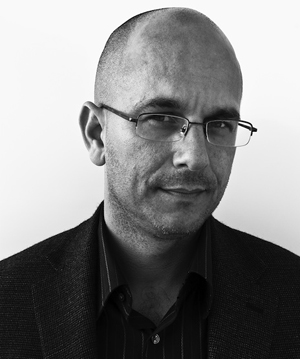Daniel Bernardi, the new chair of the cinema department, has received a $1.6 million grant from the U.S. Department of the Navy to study the impact of rumor -- or narrative “IEDs” -- on counterinsurgency operations.

Photo by Peter Stember.
What’s a narrative IED?
A narrative IED is our metaphor for the potentially dangerous rumors that take hold in contested populations. Much like their explosive cousins, these IEDs are a low-cost, low-tech weapon that can be created and planted by nearly anybody, and can instill fear in the people and in government forces.
How does a rumor do damage in a place like Afghanistan or Iraq?
In Iraq in 2005, the Multi-National Force started a cattle inoculation program ... but a rumor spread that the U.S. had embarked on a plot to starve the Iraqis by poisoning their livestock. This rumor furthered the image of the U.S. military as crusaders, and obstructed an important outreach campaign to win support in a time of extreme violence and political uncertainty. When you have a discredited government and authority figure, when people don’t have faith in those institutions, when you start shutting down or controlling media, you create a particularly volatile space for the spread of rumors.
How does your project draw from your work on the Islamic Extremist Narrative database at Arizona State University?
The project pulls extremist rhetoric from blogs, publications and other forms of media from Singapore, Indonesia and the Middle East. We sort the sources by various factors such as master narratives from Islamic history -- for example, the crusade narrative. We then look for patterns in relation to cultural history ... and try to determine which narratives have the greatest likelihood of swaying people to either turn a blind eye to terrorism or join the extremist cause.
How did you come to join the Navy Reserves?
I originally joined the Navy when I was 17, but didn’t last too long. I got into a lot of trouble and was politely asked to leave. I went to college, finished a Ph.D. and got jobs at the Sci-Fi Channel and UC-Riverside ... but had a nagging feeling like I failed to honor my word, so I decided to correct the mistake I made when I was a teenager and reenlisted in the Reserves. My goal was to do my time and get out, hopefully without deploying. But I ended up liking Navy culture and feeling challenged by what I was asked to do as an enlisted sailor, so I stayed.
What was it like when you served with the Green Berets in Iraq in 2009?
In Iraq I was a fish out of war. I had to carry an M4, wear body armor, and work and live with Iraqi soldiers who had endured great suffering and yet were trying to do whatever they could to make their country safe for their families. I met a lot of great people, from Iraqis to U.S. soldiers, sailors and Marines trying to do the right thing on their third, fourth and in some cases fifth tours ... the experience made a difference in how I see and understand the beauty of Islamic culture, the machinations of U.S. politics, and the everyday lives of the young people fighting our nation’s wars.
How did that experience compare to Active Duty with the U.S. Pacific Fleet in 2011?
[In the Pacific] I ran a large media shop, including military and civilian photographers, videographers, writers and graphic designers from several different countries. In fact, I managed an element of the Pacific Fleet Band. If you’ve never seen the Navy band cover the Black Eyed Peas to cheering and dancing crowds -- all while wearing their white uniforms -- you haven’t experienced the full cultural impact of American pop music. I guess Iraq was more physically difficult and intellectually rewarding but the Pacific was more soulful.
What does a left-leaning film scholar contribute to a project like this for the U.S. Navy?
After Iraq, the military has begun to look at humanists and social scientists to answer some questions in the very complex populations involved in insurgency and counterinsurgency. So they’re looking for someone with specific expertise in cultural narratives and also someone with a willingness not to stereotype their efforts.
What do your Navy friends think of your research?
Some call me names like “liberal,” “Marxist” and “egghead” -- the latter for more than one reason. If they look me up on the Web, they see that I’ve published on whiteness in Star Trek and racism in pornography. I won’t go into the jokes here, but rest assured they’re quite colorful. By and large sailors are tolerant and open-minded, more so in many ways than are academics. I’m just another different sort among a ship full of different sorts.